

Nutrigenomics: lessons learned and future perspectives. Skip to Main Content Advertisement Search Close Advanced Search Search Menu Skip Nav Destination Article Navigation Volume 113 Issue 3 March 2021 Article Contents Editor's Choice.
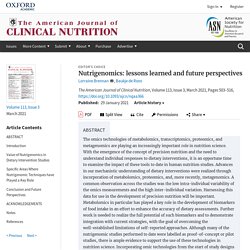
Genomics in Personalized Nutrition: Can You “Eat for Your Genes”? As discussed above, dietary omega-3 (n−3) and omega-6 (n−6) PUFA metabolism helps control many essential components in human physiology including membrane fluidity, inflammation status, organ development, and much more [108].
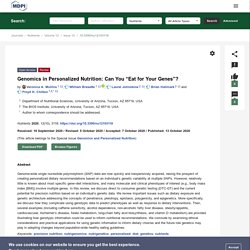
The two essential PUFAs, n−3 alpha-linolenic acid (ALA, 18:3n−3) and n−6 linoleic acid (LA, 18:2n−6), both utilize the same two desaturase and two elongase enzymes to produce the conditionally-essential, biologically-active long-chain (LC) PUFAs eicosapentaenoic acid (EPA, 20:5n−3), docosahexaenoic acid (DHA, 22:6n−3), and arachidonic acid (ARA, 20:4n−6) [31]. The rate limiting steps of LC-PUFA biosynthesis are fatty acid desaturase (FADS) enzymes [109]. Effect of Incorporating Genetic Testing Results into Nutrition Counseling and Care on Health Outcomes: An Evidence Analysis Center Systematic Review—Part II - Journal of the Academy of Nutrition and Dietetics. Arnold G.L.
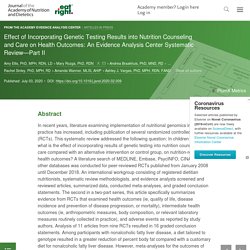
Inborn errors of metabolism in the 21(st) century: Past to present.Ann Transl Med. 2018; 6: 467Chong J.X. Buckingham K.J. Jhangiani S.N. et al.The genetic basis of Mendelian phenotypes: Discoveries, challenges, and opportunities.Am J Hum Genet. 2015; 97: 199-215Visscher P.M. Wray N.R. Consensus Report of the Academy of Nutrition and Dietetics: Incorporating Genetic Testing into Nutrition Care - Journal of the Academy of Nutrition and Dietetics. Andersen D.
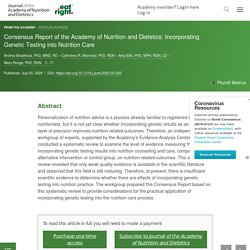
Baird S. Nutrigenetics/Nutrigenomics, Personalized Nutrition, and Precision Healthcare. Nutritional Epigenomics and Age-Related Disease. We use cookies to enhance your experience on our website.
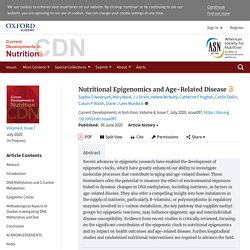
By clicking 'continue' or by continuing to use our website, you are agreeing to our use of cookies. You can change your cookie settings at any time. We use cookies to enhance your experience on our website.By continuing to use our website, you are agreeing to our use of cookies. You can change your cookie settings at any time. <a href=" Find out more</a> Skip to Main Content Search Close. The Role of Metagenomics in Precision Nutrition.
Conventional recommendations for dietary intervention have been generally based on population groups divided by gender and age.
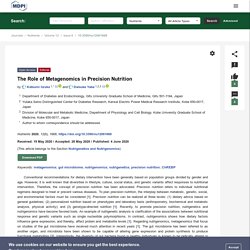
However, it is well known that diversities in lifestyle, culture, social status, and genetic variants affect responses to nutritional intervention. Therefore, the concept of precision nutrition has been advocated. Precision nutrition refers to individual nutritional regimens designed to treat or prevent various diseases. To plan precision nutrition, the interplay between metabolic, genetic, social, and environmental factors must be considered [1]. Advancements in Personalized Nutrition Technologies: Guiding Principles for Registered Dietitian Nutritionists - Journal of the Academy of Nutrition and Dietetics. Abstract Individualized nutrition counseling and care is a cornerstone of practice for registered dietitian nutritionists (RDNs).
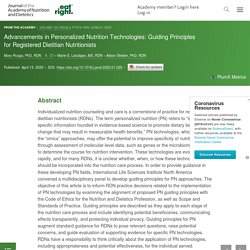
The term personalized nutrition (PN) refers to “individual-specific information founded in evidence-based science to promote dietary behavior change that may result in measurable health benefits.” PN technologies, which include the “omics” approaches, may offer the potential to improve specificity of nutrition care through assessment of molecular-level data, such as genes or the microbiome, in order to determine the course for nutrition intervention. These technologies are evolving rapidly, and for many RDNs, it is unclear whether, when, or how these technologies should be incorporated into the nutrition care process. In order to provide guidance in these developing PN fields, International Life Sciences Institute North America convened a multidisciplinary panel to develop guiding principles for PN approaches.
Sikand G. Personalised nutrition technologies: a new paradigm for dietetic practice and training in a digital transformation era - Abrahams - 2020 - Journal of Human Nutrition and Dietetics. Personalised nutrition in patient‐centred care It has recently been estimated that one in five early deaths worldwide is associated with poor dietary habits 1.
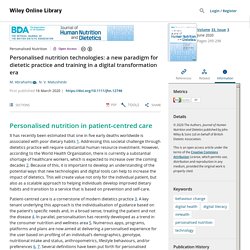
Addressing this societal challenge through dietetics practice will require substantial human resource investment. However, according to the World Health Organization, there is currently a substantial shortage of healthcare workers, which is expected to increase over the coming decades 2. Because of this, it is important to develop an understanding of the potential ways that new technologies and digital tools can help to increase the impact of dietetics. This will create value not only for the individual patient, but also as a scalable approach to helping individuals develop improved dietary habits and transition to a service that is based on prevention and self‐care.
Toward the Definition of Personalized Nutrition: A Proposal by The American Nutrition Association: Journal of the American College of Nutrition: Vol 39, No 1. Introduction.
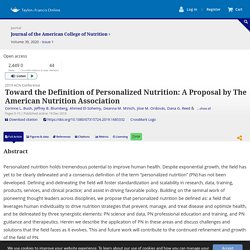
Nutritionist Guide to Direct-to-Consumer Genetic Tests and P... : Nutrition Today. The prevalence of noncommunicable diseases (NCDs), such as obesity, cardiovascular disease, diabetes, and cancer, continues to rise globally.1 In the United States, recent estimates of these diseases range from 9.4% for diabetes2 to 37.7% for obesity.3 In addition to the major public health burden inflicted by NCDs is a substantial economic burden, estimated to cost a staggering $94.9 trillion for chronic conditions in 2015-2050 in the United States.4 Pharmacological and lifestyle interventions, including dietary, constitute the major effective strategies for the prevention, management, and treatment of several NCDs, as agreed upon by global health guidelines, such as the World Health Organization’s Guidelines for the Prevention of Cardiovascular Disease.5 Whether these strategies could be tailored and personalized to meet an individual’s need is a major area of interest, which fueled the recent “precision medicine” movement.6 “Can you show me the genes?”
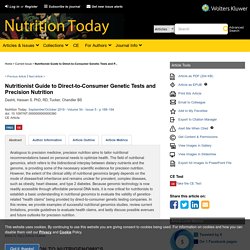
Nutritional Genomics: Exploration of Personal Genetic Testing in the Classroom - Journal of the Academy of Nutrition and Dietetics. Personalized Nutrition: Translating the Science of NutriGenomics Into Practice: Proceedings From the 2018 American College of Nutrition Meeting: Journal of the American College of Nutrition: Vol 38, No 4. Introduction Nutritional genomics is the study of the effects of foods and food constituents on gene expression. Nutritional genomics aims to develop a rational means to optimize nutrition through the identification of the person's genotype and this defines the relationship between nutrients and human health. Individuals cannot change their genetics, but they can eat the right foods to support genetic predispositions, take the right supplements to support gene variations, and promote normal cell function and structure.
Indeed, poor diet can be a risk factor of disease. Given that dietary components can alter gene expression and that the degree to which diet influences health and disease depend upon an individuals genetic make up, the use of pharmacogenomics technologies should be well defined in order to fully embrace their potential application for diagnostic and prognostic purposes. Published online: 17 May 2019 Figure 1. Understanding genomics Figure 2. Nutrigenomics of Vitamin D. 1. Introduction Nutrigenomics is a research field that developed some 15 years ago after the completion of the human genome [1,2].
Human diet is a complex mixture of biologically active molecules, some of which (i) have a direct effect on gene expression, (ii) modulate, after being metabolized, the activity of a transcription factor, or (iii) stimulate a signal transduction cascade that ends with the induction of a transcription factor [3]. Nutrigenomics aims to describe, characterize, and integrate the interactions between dietary compounds and genome-wide gene expression. Genomic loci related to metabolic and/or regulatory pathways may provide a molecular explanation of how a dietary compound mediates its effects and whether it influences the risk of diet-related diseases. The discipline of epigenomics studies the effect of environmental events on the expression of the genome [4].
Update on Genetic Testing - Today's Dietitian Magazine. May 2019 Issue Update on Genetic Testing By Jill Weisenberger, MS, RDN, CDE, CHWC, FAND Today’s Dietitian Vol. 21, No. 5, P. 36 Is it ready for prime time to inform personalized nutrition advice? Personalized advice has long been the cornerstone of MNT. Nutrigenomics: Epigenetics and cancer prevention: A comprehensive review: Critical Reviews in Food Science and Nutrition: Vol 0, No 0. Due to change in lifestyle and food habits, people are more at risk of diet-related diseases and cancers.
It is also established that dietary modifications significantly reduce the risk of diseases. Nutrigenomics is relatively fresh discipline, but possess an enormous potential that can apply for prevention and management of certain carcinomas and diseases. This review enables us to generate useful information for scientists and health professionals regarding the role of Nutrigenomics in the prevention of diet and lifestyle-related diseases like cancer. It influences health conditions of individuals and susceptibility of disease by defining the metabolic response and gene expression. Epigenetic modifications can perform a significant role in disease occurrence and pathogenesis. Nutritional Genomics in Precision Nutrition: An Evidence Analysis Center Scoping Review - Journal of the Academy of Nutrition and Dietetics. Guide for Current Nutrigenetic, Nutrigenomic, and Nutriepigenetic Approaches for Precision Nutrition Involving the Prevention and Management of Chronic Diseases Associated with Obesity.
Translation of Nutritional Genomics into Nutrition Practice: The Next Step. The Emerging Role of Epigenetics on Dietary Treatment for Epilepsy. Personalised nutrition: What makes you so special? - Betts - 2016 - Nutrition Bulletin. Personalised nutrition can be defined as developing unique nutrition guidelines for each individual; precision nutrition seeks to develop effective approaches based on the combination of an individual's genetic, environmental and lifestyle factors.
The former infers variants that underlie traits are largely fixed (i.e. stable across time) and appeals to the notion that we are inherently different from one another. The latter opens up the possibility that what we do and where we are may be more important than what we are. While there are undoubtedly a specific minority of individuals who clearly require a more personalised approach to nutrition, several criteria must be fulfilled before we can justify or implement personalised nutrition for the general population.
Nutrigenetic משלוח בדיקות גנטיות לתזונה. Guide and Position of the International Society of Nutrigenetics/Nutrigenomics on Personalized Nutrition: Part 2 - Ethics, Challenges and Endeavors of Precision Nutrition - FullText - Journal of Nutrigenetics and Nutrigenomics 2016, Vol. 9, No. 1. Kohlmeier M.a · De Caterina R.b · Ferguson L.R.c · Görman U.d · Allayee H.e · Prasad C.f · Kang J.X.g · Nicoletti C.F.h · Martinez J.A.i, j Author affiliations Corresponding Author J. Alfredo Martínez. Guide and Position of the International Society of Nutrigenetics/Nutrigenomics on Personalised Nutrition: Part 1 - Fields of Precision Nutrition.
Position of the Academy of Nutrition and Dietetics: Nutritional Genomics 2014.